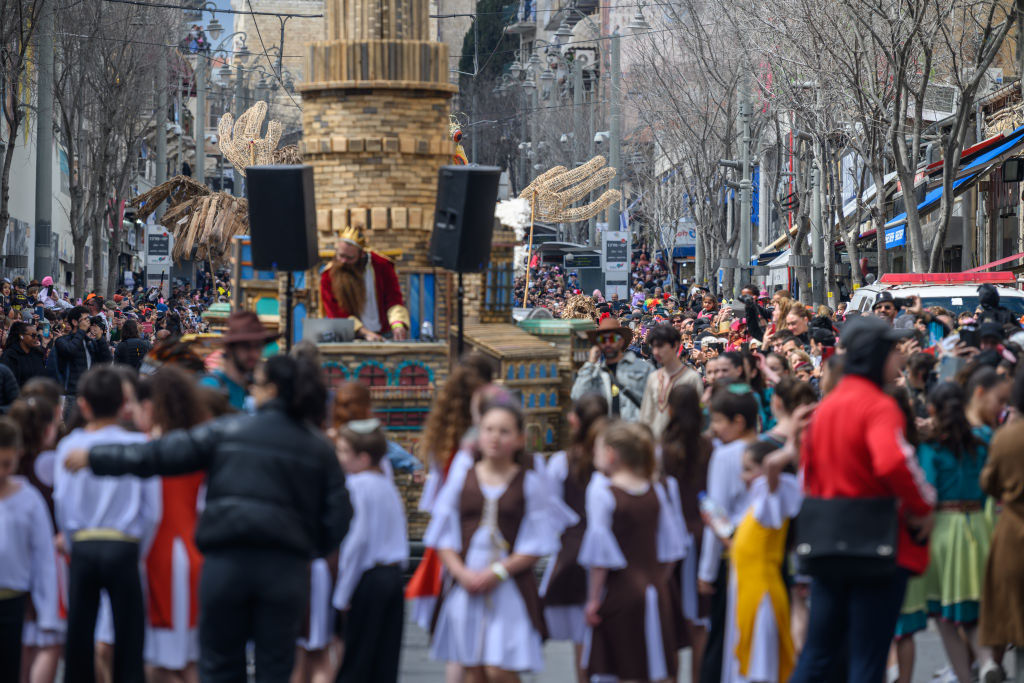 People participate in the annual Purim Parade on Shushan Purim on March 25, 2024 in Jerusalem. (Photo by Alexi J. Rosenfeld/Getty Images)
People participate in the annual Purim Parade on Shushan Purim on March 25, 2024 in Jerusalem. (Photo by Alexi J. Rosenfeld/Getty Images) Now in Los Angeles some long
not for Egyptian fleshpots but
the joys of Shushan as they throng
in markets all defined as glatt.
Not only those from Teheran,
but those from Brooklyn also hanker,
like those from Queens and Kazakhstan
and Hungary and Casablanca,
to be in ancient Persia, where
Queen Esther, helped by Mordecai,
gave Ahashverosh one great scare,
and his Prime Minister, whose lie
was like those of a later rasha,
who for his Holocaust denial
deserves to be, like Haman Pasha,
hanged sans the travesty of trial.
To Pico Glatt the women go,
and stocking up with hamantaschen
don’t talk of Michelangelo,
but long for Persia with a passion,
as do all Ashkenazi Jews
joined by Sephardim in a crowd.
Every Purim they accuse
Amalek, happily allowed
to dream of wiping out their foes,
as once they did in Shushan, when
a hidden God helped them oppose
Jew hatred in the hearts of men
who like the ones today once tried
to wipe them out. With adlayada,
and Shushan memories as guide,
they’ll all march madder than a hatter,
and I’ll march with them too to Gelson’s,
no more to Ralph’s, but to Pavilions,
declaring: “No more Bergen-Belsens,
no more massacres of millions….
….though since October 7 this
is obsolete, “No more again”
a target Jews are forced to miss,
unable to respond “Amen.
What happened on Shmini Atseret
makes it too hard for me to say,
its pain too hard for me to bear it,
while on this Shushan Purim day
I pray for Purim-paired repair,
like Shushan Purim, Purim’s pair.
I recalled this poem on Shushan Purim, 5784, 3 /25/2e, after reading “Walled Cities “from the Time of Joshua” Celebrate Shushan Purim – Why?” thetorah.com, by Prof. Eyal Ben-Eliyahu.
Joshua as a Foil to Hadrian
Whereas for the Romans, the establishment of the pomerium marked their status as the founders of the new colony, the rabbis were aware that the Jewish entitlement to the cities in the land of Israel was vested not in their status as founders, but in the divine promise to the patriarchs, fulfilled with Joshua’s conquest of the cities in Canaan. This makes Joshua an ideal figure for them to utilize.
Joshua did not establish Jerusalem, rather, according to Joshua 10:1–27, 12:10, he defeated the king of Canaanite Jerusalem, and ostensibly reestablished the city as Israelite.[20] As the conqueror of Jerusalem, who established it as Israelite, Joshua becomes a polemical mirror-image of what Hadrian claimed on his coin.
Gershon Hepner is a poet who has written over 25,000 poems on subjects ranging from music to literature, politics to Torah. He grew up in England and moved to Los Angeles in 1976. Using his varied interests and experiences, he has authored dozens of papers in medical and academic journals, and authored “Legal Friction: Law, Narrative, and Identity Politics in Biblical Israel.” He can be reached at gershonhepner@gmail.com.























 More news and opinions than at a Shabbat dinner, right in your inbox.
More news and opinions than at a Shabbat dinner, right in your inbox.